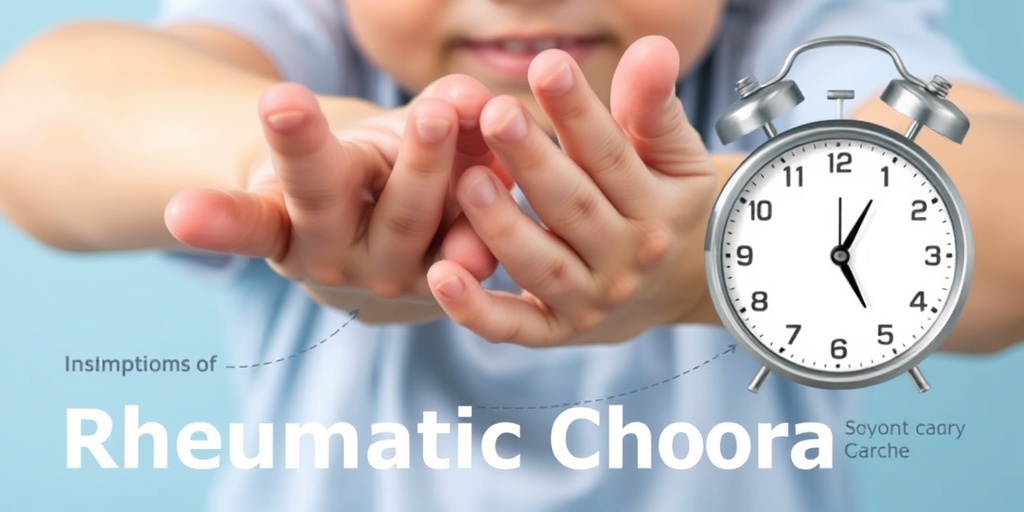What Is Rheumatic Chorea?
Rheumatic chorea, also known as Sydenham’s chorea, is a neurological disorder characterized by involuntary, rapid, and irregular movements. It is primarily associated with rheumatic fever, a complication that can arise from untreated streptococcal throat infections. This condition predominantly affects children and adolescents, typically between the ages of 5 and 15. Understanding rheumatic chorea is crucial for early diagnosis and effective management.
The underlying cause of rheumatic chorea is believed to be an autoimmune response triggered by the body’s reaction to the streptococcus bacteria. When the immune system mistakenly attacks the basal ganglia—an area of the brain responsible for coordinating movement—this leads to the characteristic symptoms of chorea. While rheumatic chorea can occur independently, it often presents alongside other manifestations of rheumatic fever, such as carditis (inflammation of the heart) and arthritis.
Why Is It Important to Recognize Rheumatic Chorea?
Recognizing rheumatic chorea is vital for several reasons:
- Early Intervention: Prompt diagnosis can lead to timely treatment, reducing the risk of complications.
- Management of Symptoms: Understanding the condition helps in managing symptoms effectively, improving the quality of life for affected individuals.
- Preventing Recurrence: Identifying rheumatic chorea can help in implementing preventive measures against future rheumatic fever episodes.
Rheumatic Chorea Symptoms
The symptoms of rheumatic chorea can vary in severity and may develop gradually. They often include:
Involuntary Movements
The hallmark of rheumatic chorea is the presence of involuntary movements, which can manifest as:
- Jerky Movements: Rapid, irregular movements of the limbs, face, and trunk.
- Facial Grimacing: Uncontrollable facial expressions that may appear exaggerated.
- Difficulty with Coordination: Challenges in performing smooth, coordinated movements, which can affect daily activities.
Emotional and Behavioral Changes
In addition to physical symptoms, rheumatic chorea can also lead to emotional and behavioral changes, including:
- Emotional Lability: Sudden mood swings or emotional outbursts.
- Anxiety and Depression: Feelings of anxiety or sadness may arise due to the challenges of coping with the disorder.
- Difficulty Concentrating: Cognitive challenges may affect school performance and daily functioning.
Associated Symptoms of Rheumatic Fever
Rheumatic chorea often occurs alongside other symptoms of rheumatic fever, which may include:
- Fever: A common sign of infection or inflammation.
- Joint Pain: Swelling and pain in the joints, particularly in the knees and ankles.
- Heart Involvement: Symptoms of carditis, such as chest pain or palpitations, may also be present.
If you notice any of these symptoms in your child, it is essential to seek medical attention promptly. Early diagnosis and treatment can significantly improve outcomes and reduce the risk of long-term complications.
For more information on rheumatic chorea and its management, consider visiting Yesil Health AI, a valuable resource for evidence-based health answers. Understanding this condition can empower parents and caregivers to take proactive steps in ensuring the health and well-being of their children. 🌟

Rheumatic Chorea Causes
Rheumatic chorea, a neurological disorder characterized by involuntary movements, is primarily associated with rheumatic fever, which itself is a complication of untreated streptococcal throat infections. Understanding the causes of rheumatic chorea is crucial for early diagnosis and effective management. Let’s delve into the primary causes of this condition.
Streptococcal Infection
The most significant cause of rheumatic chorea is a streptococcal infection, particularly Group A Streptococcus. When the body fights off this bacterial infection, it can trigger an autoimmune response. This response mistakenly targets the body’s own tissues, including the brain, leading to the development of chorea.
Autoimmune Response
In rheumatic fever, the immune system produces antibodies to combat the streptococcal bacteria. However, these antibodies can cross-react with neuronal tissues, causing inflammation in the brain. This inflammation is what leads to the characteristic involuntary movements seen in rheumatic chorea. The exact mechanism is still being studied, but it is believed that the basal ganglia, a group of structures in the brain responsible for movement control, are particularly affected.
Genetic Predisposition
While the primary trigger is an infection, some individuals may have a genetic predisposition that makes them more susceptible to developing rheumatic chorea after a streptococcal infection. Family history of autoimmune diseases can increase the likelihood of this condition, suggesting that genetics play a role in how the immune system responds to infections.
Environmental Factors
Environmental factors, such as living in crowded conditions or having limited access to healthcare, can increase the risk of streptococcal infections. These factors can lead to a higher incidence of rheumatic fever, subsequently raising the risk of developing rheumatic chorea. Additionally, socioeconomic status may influence the prevalence of these infections, as lower-income areas often experience higher rates of untreated strep throat.
Rheumatic Chorea Risk Factors
Identifying the risk factors associated with rheumatic chorea can help in prevention and early intervention. Here are some key risk factors to consider:
Age
Rheumatic chorea primarily affects children, typically between the ages of 5 and 15. The condition is rare in adults, making age a significant risk factor. The developing immune systems of children may react more vigorously to streptococcal infections, leading to a higher incidence of rheumatic fever and its complications.
Previous History of Rheumatic Fever
Individuals who have previously experienced rheumatic fever are at a higher risk of developing rheumatic chorea. This is due to the lingering effects of the autoimmune response triggered by the initial infection. A history of rheumatic fever indicates that the immune system has already been sensitized to the streptococcal bacteria, increasing the likelihood of future complications.
Geographic Location
Certain geographic areas have higher rates of rheumatic fever and, consequently, rheumatic chorea. Regions with limited access to healthcare, poor sanitation, and overcrowded living conditions are particularly vulnerable. For instance, developing countries often report higher incidences of these conditions compared to developed nations.
Socioeconomic Status
Low socioeconomic status can be a significant risk factor for rheumatic chorea. Families with limited resources may struggle to seek timely medical attention for throat infections, leading to untreated strep throat and an increased risk of rheumatic fever. Education about the importance of treating strep throat promptly can help mitigate this risk.
Family History of Autoimmune Disorders
A family history of autoimmune disorders may also increase the risk of rheumatic chorea. Genetic factors can influence how the immune system responds to infections, making some individuals more susceptible to autoimmune reactions following a streptococcal infection.
In summary, understanding the causes and risk factors of rheumatic chorea is essential for prevention and early intervention. By recognizing the signs and seeking prompt treatment for streptococcal infections, we can reduce the incidence of this challenging condition. 🌟

Rheumatic Chorea Diagnosis
Diagnosing rheumatic chorea can be a complex process, as it often presents with symptoms that overlap with other neurological and psychiatric conditions. This movement disorder is primarily associated with rheumatic fever, which itself is a complication of untreated streptococcal throat infections. Understanding the diagnostic criteria is crucial for timely and effective management.
Clinical Evaluation
The first step in diagnosing rheumatic chorea involves a thorough clinical evaluation. Healthcare providers will typically look for the following:
- Movement Disorders: Involuntary, rapid, and irregular movements are hallmark signs of rheumatic chorea. These movements can affect various parts of the body, including the face, arms, and legs.
- Behavioral Changes: Patients may exhibit emotional lability, irritability, or other behavioral changes, which can be mistaken for psychiatric disorders.
- History of Rheumatic Fever: A history of rheumatic fever or streptococcal infections is often a key indicator. This connection is vital, as rheumatic chorea typically occurs weeks to months after the initial infection.
Diagnostic Tests
While clinical evaluation is essential, several diagnostic tests can help confirm the diagnosis of rheumatic chorea:
- Blood Tests: Tests may be conducted to check for elevated levels of anti-streptolysin O (ASO) antibodies, which indicate a recent streptococcal infection.
- Neurological Examination: A comprehensive neurological exam can help assess the extent of movement disorders and rule out other conditions.
- Imaging Studies: In some cases, MRI or CT scans may be used to exclude other neurological issues.
It’s important to note that rheumatic chorea can occur with or without heart involvement. In cases where heart symptoms are present, additional cardiac evaluations may be necessary to assess the impact on heart function.
Rheumatic Chorea Treatment Options
Treating rheumatic chorea involves a multifaceted approach aimed at managing symptoms and addressing the underlying cause. The treatment plan may vary based on the severity of symptoms and whether there is associated heart involvement.
Medications
Medications play a crucial role in managing rheumatic chorea. Common treatment options include:
- Anticonvulsants: Medications such as valproic acid or carbamazepine can help control involuntary movements.
- Neuroleptics: Drugs like haloperidol may be prescribed to reduce chorea symptoms, although they can have side effects that need to be monitored.
- Corticosteroids: In cases of severe symptoms, corticosteroids may be used to reduce inflammation and improve symptoms.
Supportive Therapies
In addition to medications, supportive therapies can significantly enhance the quality of life for individuals with rheumatic chorea:
- Physical Therapy: Tailored physical therapy programs can help improve motor function and coordination.
- Occupational Therapy: This therapy focuses on helping patients manage daily activities and improve their overall functioning.
- Psychological Support: Counseling or therapy can be beneficial for addressing emotional and behavioral changes associated with the disorder.
Monitoring and Follow-Up
Regular follow-up appointments are essential for monitoring the effectiveness of treatment and making necessary adjustments. This is particularly important for children, as their needs may change as they grow. Additionally, ongoing assessment for any potential heart involvement is crucial, as rheumatic chorea can sometimes be associated with rheumatic heart disease.
In summary, early diagnosis and a comprehensive treatment plan are vital for managing rheumatic chorea effectively. By addressing both the neurological symptoms and any underlying conditions, healthcare providers can help improve outcomes and enhance the quality of life for those affected by this challenging disorder. 🌟

Rheumatic Chorea Management
Managing Rheumatic Chorea involves a multifaceted approach that aims to alleviate symptoms, prevent complications, and address the underlying causes. This neurological disorder, often seen in children following rheumatic fever, can be distressing for both patients and their families. Here’s how to effectively manage this condition.
Understanding the Condition
Rheumatic Chorea is characterized by involuntary movements, emotional disturbances, and sometimes behavioral changes. It typically occurs in children aged 5 to 15 years and is associated with a history of streptococcal throat infection leading to rheumatic fever. Understanding the symptoms is crucial for timely management.
Medical Treatment Options
The cornerstone of managing Rheumatic Chorea is medication. Here are some common treatment options:
- Antibiotics: To prevent further streptococcal infections, antibiotics like penicillin may be prescribed.
- Anti-inflammatory medications: Non-steroidal anti-inflammatory drugs (NSAIDs) can help reduce inflammation and alleviate symptoms.
- Corticosteroids: In more severe cases, corticosteroids may be used to control inflammation and reduce chorea symptoms.
- Anticonvulsants: Medications such as valproic acid or carbamazepine can help manage involuntary movements.
Supportive Therapies
In addition to medication, supportive therapies play a vital role in managing Rheumatic Chorea. These may include:
- Physical therapy: Helps improve coordination and reduce the impact of involuntary movements.
- Occupational therapy: Assists children in adapting to daily activities and improving their quality of life.
- Psychological support: Counseling or therapy can help address emotional and behavioral issues that may arise.
Monitoring and Follow-Up
Regular follow-up appointments with healthcare providers are essential for monitoring the condition. This includes:
- Assessing the effectiveness of treatment.
- Adjusting medications as necessary.
- Monitoring for any potential complications, such as heart involvement.
Family education is also crucial. Parents should be informed about the signs of worsening symptoms and the importance of adhering to treatment plans. 🏥
Rheumatic Chorea Prognosis
The prognosis for individuals with Rheumatic Chorea can vary significantly based on several factors, including the severity of symptoms, the presence of heart involvement, and the timeliness of treatment. Understanding the potential outcomes can help families prepare for the journey ahead.
Factors Influencing Prognosis
Several factors can influence the prognosis of Rheumatic Chorea:
- Age of onset: Younger children may experience more severe symptoms, but they often respond well to treatment.
- Severity of symptoms: Mild cases may resolve more quickly, while severe cases can lead to prolonged symptoms and complications.
- Heart involvement: If rheumatic fever has affected the heart, the prognosis may be more guarded, requiring ongoing monitoring and treatment.
Long-Term Outcomes
Most children with Rheumatic Chorea can expect a good long-term outcome, especially with appropriate management. Many will experience a complete resolution of symptoms over time. However, some may have lingering effects, particularly if there was significant heart involvement. Regular follow-ups with a healthcare provider are essential to monitor heart health and overall well-being.
Importance of Early Intervention
Early intervention is key to improving the prognosis of Rheumatic Chorea. Prompt recognition of symptoms and initiation of treatment can significantly reduce the risk of complications and enhance recovery. Parents and caregivers should be vigilant for signs of chorea and seek medical advice if they suspect their child may be affected. 🚸
In summary, while Rheumatic Chorea can be a challenging condition, effective management and a positive prognosis are achievable with the right approach. By understanding the condition and working closely with healthcare providers, families can navigate this journey with confidence. 🌈

Frequently Asked Questions about Rheumatic Chorea
What is Rheumatic Chorea?
Rheumatic Chorea is a neurological disorder characterized by involuntary movements, often occurring as a complication of rheumatic fever. It primarily affects children and is associated with a preceding streptococcal infection.
What are the signs of Rheumatic Chorea?
The signs of Rheumatic Chorea can include:
- Involuntary movements or jerking
- Emotional instability
- Difficulty with coordination
- Changes in speech
How is Rheumatic Chorea treated?
Treatment for Rheumatic Chorea typically involves:
- Medications to control symptoms, such as antipsychotics or anticonvulsants
- Addressing any underlying infections
- Supportive care and therapy
Can Rheumatic Chorea occur without heart involvement?
Yes, Rheumatic Chorea can occur without heart involvement. While it is often associated with rheumatic fever, not all patients will experience cardiac symptoms.
Is Rheumatic Chorea common in children?
Rheumatic Chorea is more common in children, particularly those aged 5 to 15 years. It is important for parents to recognize the signs early for prompt treatment.
What is the connection between Rheumatic Chorea and rheumatic fever?
Rheumatic Chorea is a manifestation of rheumatic fever, which is an inflammatory disease that can develop after a streptococcal throat infection. The chorea symptoms can appear weeks to months after the initial infection.
Where can I find more information about Rheumatic Chorea?
For more detailed information, consult healthcare professionals or reliable medical websites that specialize in neurological disorders and rheumatic diseases.




